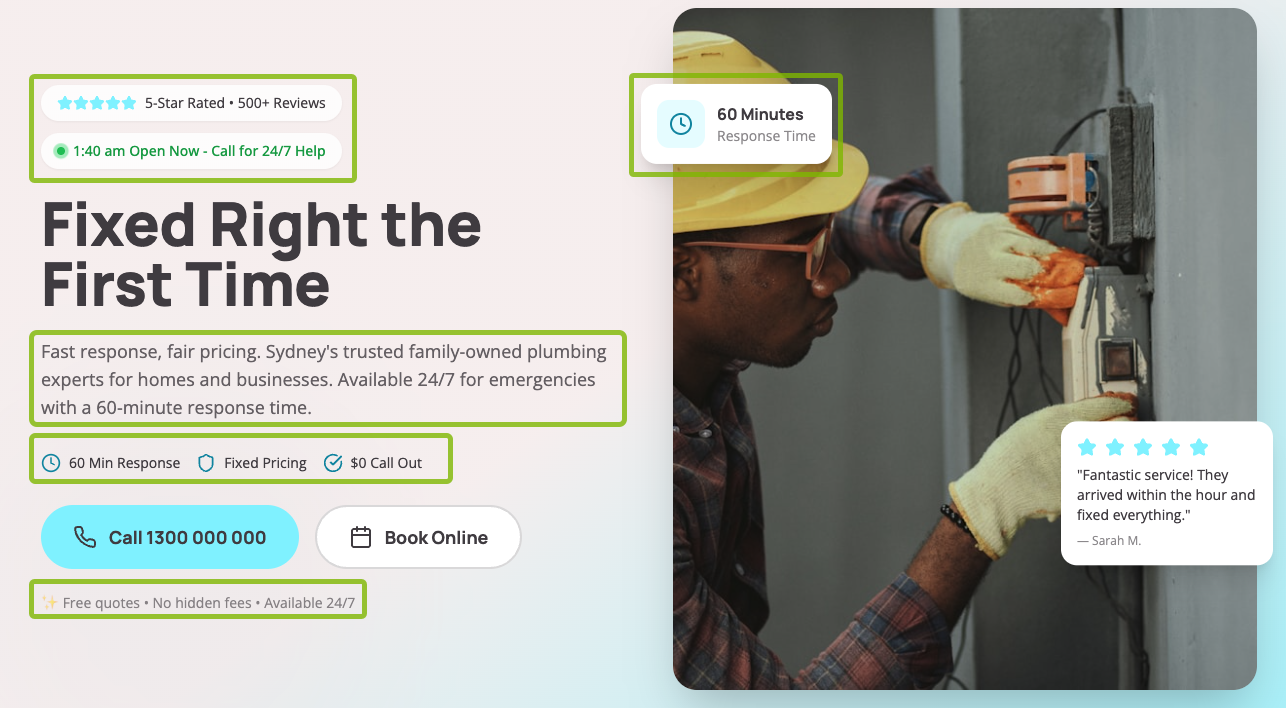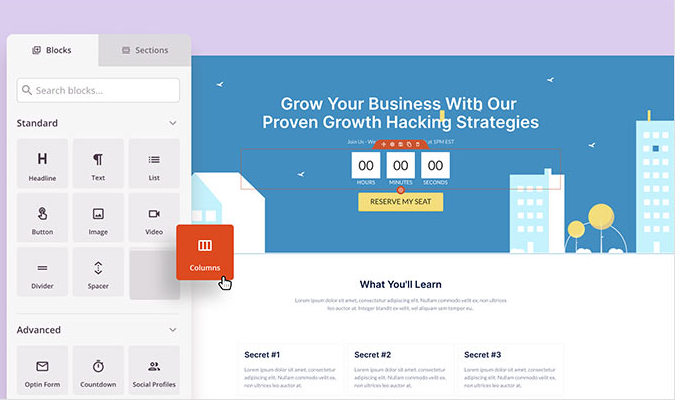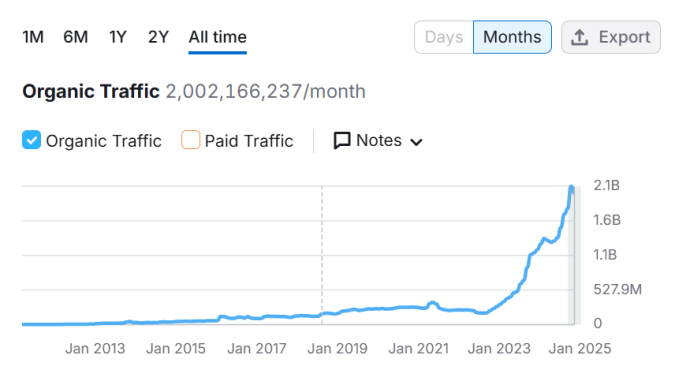Partnering with a competent ecommerce hosting provider has numerous benefits for your business. Your online store will be available whenever your customers want to purchase and you’ll be able to process customer transactions securely, plus a good host will help you manage your store with little technical experience.
In our eyes, Bluehost is the best ecommerce hosting provider for most users with the bountiful features included in its affordable plans.
Whether you’re starting an online store from scratch or migrating an existing store, Bluehost has everything you need to succeed. All hosting plans come with a ton of key features included. Get multi-layer caching, free SSL, unmetered bandwidth, and site monitoring and statistics.
The Bluehost marketplace also offers hundreds of ecommerce plugins to expand your store’s capabilities. This host provides the perfect combination of reliability, ease of use, and customization for all levels of ecommerce experience. Plus, you get all this at an affordable price.
We think Bluehost ticks the main boxes for most people, but some of the options on our list may work better for your particular needs. Lets dive into all of our top picks.
The 7 Best Ecommerce Hosting Providers to Consider
- Bluehost – Best ecommerce hosting for most
- Atlantic.Net – Best for PCI-Compliant Ecommerce Hosting
- HostGator – Best budget ecommerce hosting with simple scaling
- LiquidWeb – Best for managed WooCommerce hosting
- Hosting.com – Best high-performance ecommerce hosting
- SiteGround – Best for your first ecommerce store
- DreamHost – Best for hosting on a budget
Ecommerce Hosting Provider Reviews
#1 – Bluehost – Best Ecommerce Hosting for Most
Bluehost is one of the most recognizable brands in web hosting, maintaining a strong reputation over nearly three decades. Its WooCommerce hosting is the first choice for most new and existing ecommerce stores, as it’s flexible enough to accommodate everyone from experienced WordPress site creators to users who have never worked on WordPress before.

One-click WordPress setup means building an online store couldn’t be easier even if you’re not familiar with the platform. Beginners also don’t have to worry about navigating an incomprehensible backend.
Bluehost has everything you need to launch your online store already configured. You get a complete storefront, shopping cart, inventory management, and marketing tools built into your WooCommerce hosting plan.
Similarly, expert designers can harness the full power of the robust backend to create a one-of-a-kind online store. From adjusting product image sizes to optimizing page visuals, Bluehost provides the control and customization that expert designers crave. There are also numerous extensions to help optimize your online store.
Bluehost’s reliability is ideal for an online store that needs as close to 100% uptime as possible. In practice, Bluehost consistently delivers around 99.9% uptime, which is good enough for most small and midsize stores.
Bluehost includes a free self-service WordPress migration tool and a free domain for one year with eligible hosting plans. Paid expert migrations are also available. Plus, you can rely on Bluehost’s responsive customer support in case of any issues with your site, able to be reached 24/7 via phone or live chat.
Bluehost currently offers two main WooCommerce plans. The entry ecommerce plan (often called eCommerce Essentials) starts at $6.95 per month on a 12-month term and comes with everything you need to launch your online store, including a storefront, email marketing, one-click payment processing, unlimited products, WooCommerce installation, and customer product reviews.
The higher-tier ecommerce plan (eCommerce Premium) starts at $9.95 per month on a 12-month term. You get additional features like discount codes, product customization, online bookings and appointment scheduling, and local and country tax management. This plan is perfect for scaling an existing online store.
So whether you’re building from scratch or expanding your store, Bluehost is an ideal hosting partner for your online business.
#2 Atlantic.Net — Best for PCI-Compliant Ecommerce Hosting
If you’re running an online store that processes credit cards directly, Atlantic.Net’s PCI-compliant hosting is built to take most of the compliance headaches off your plate. Instead of piecing together firewalls, VPNs, backups, and monitoring from different vendors, you get a single, hardened environment that’s already designed around PCI DSS requirements.
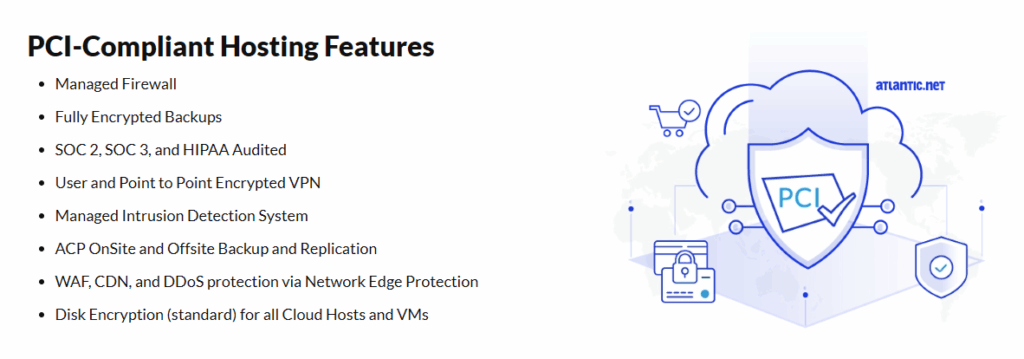
Atlantic.Net runs its PCI solutions on top of SOC 2 and SOC 3–certified infrastructure with over 30 years in the hosting business. You can deploy your ecommerce stack on cloud servers, VPS, dedicated servers, or a hybrid setup and still keep everything inside the same audit-ready, fully monitored environment.
For ecommerce brands that can’t afford a breach—or the fines and chargebacks that come with one—the big selling point is the managed security layer. Atlantic.Net’s team handles 24/7 monitoring, log management, vulnerability scans, and incident response, so you’re not scrambling to become a security expert just to keep selling online.
Standout PCI features for ecommerce hosting include:
- Managed firewall: A fully managed firewall stack tailored to your store’s traffic, with fine-grained control over inbound and outbound connections.
- Encrypted backups and storage: Fully encrypted backups plus disk encryption by default on cloud hosts and VMs, so cardholder data is protected at rest.
- Encrypted VPN access: User and point-to-point encrypted VPNs for secure admin access to your ecommerce environment—no more logging in over open networks.
- Intrusion detection and edge protection: Managed intrusion detection systems, web application firewall (WAF), CDN, and DDoS protection to defend against common ecommerce attacks.
- Onsite/offsite backup and replication: Redundant backups and replication options to help keep your store online even if something goes wrong in one data center.
- Audit-ready documentation: PCI-ready hosting with the documentation and security controls you need to get through audits and questionnaires faster.
- 24/7/365 security and support: Around-the-clock security monitoring and support, so issues get handled before they turn into expensive downtime.
This isn’t the cheapest way to host a simple store—but if you’re processing serious transaction volume or working in a regulated industry, Atlantic.Net can be a cost-effective alternative to hiring in-house security staff and managing PCI on your own. You get a hardened, fully managed environment that’s purpose-built for secure ecommerce, backed by a 100% uptime SLA on critical infrastructure.
#3 – HostGator – Best Budget Ecommerce Hosting With Simple Scaling
Speed and performance are crucial for any ecommerce website. HostGator used to promote cloud hosting for this, but its cloud plans are no longer sold to new customers. Even so, HostGator’s current shared and WordPress hosting plans give small stores a fast, secure, and affordable starting point, and existing HostGator cloud customers can keep using their scalable cloud environments.
The best part about using a HostGator shared or WordPress plan to host your ecommerce shop is that you’re getting a high-grade service at a price point that’s still comparable to entry-level shared hosting, with the option to upgrade to VPS or dedicated hosting later on as traffic grows.

For a few dollars per month on promo pricing, you’ll benefit from a plan that’s quick to launch and built to scale up when you need more power.
HostGator’s current hosting lineup includes a free domain for the first year on eligible terms, a free SSL certificate, Cloudflare CDN, malware scanning, WordPress staging, and 24/7 chat and phone support.
Other perks include:
- Integrated caching for fast page loading
- Simple and intuitive dashboard to track performance
- Automatic failover-style protections and DDoS mitigation baked in
- On-demand upgrades to VPS or dedicated servers to handle traffic spikes and growth
- Data backups and mirrored infrastructure for safety and redundancy
HostGator also delivers a 99.9% uptime guarantee and offers a free domain for your first year when you sign up for an eligible plan.
Here’s a quick overview of what you can expect now:
- Hatchling (shared): promo pricing typically starts around the $3–$4 per month range for one site
- Baby: adds support for unlimited sites and more resources
- Business: adds dedicated IP, SEO tools, and extras for growing stores
The plans all come with the same core features, and you can move up tiers mostly for more resources and a few ecommerce-friendly extras. Sign up now to get started.
#4 – Liquid Web – Best for Managed WooCommerce Hosting
WooCommerce is an exceptional ecommerce platform, but not everyone wants to bother with server administration and other technical aspects of managing an online store. Managed WooCommerce hosting allows you to outsource the technical aspects to a dedicated expert and Liquid Web is the best provider for those looking for managed WooCommerce hosting.
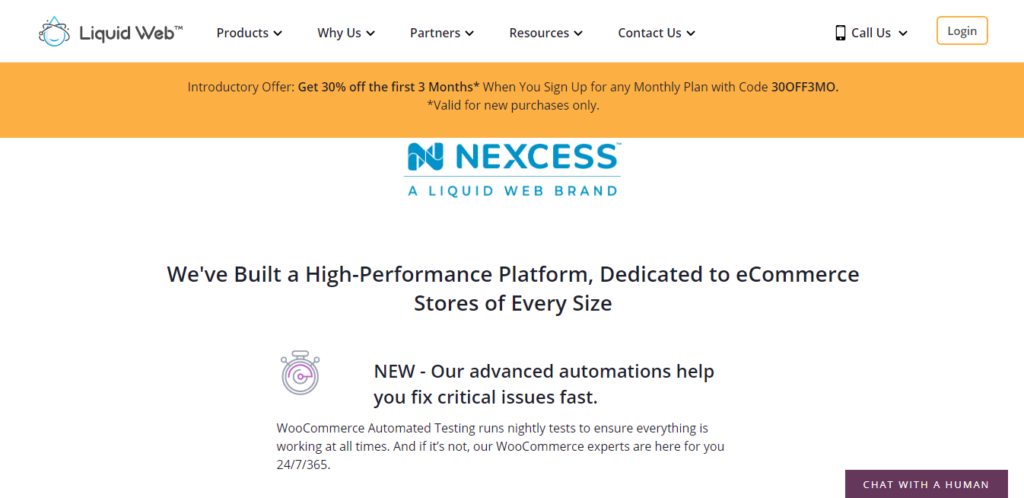
You don’t have to worry about the limitations of hosting your online store on a shared server. Liquid Web and its Nexcess platform focus on VPS, cloud, and dedicated environments that are tuned specifically for WooCommerce. All managed WooCommerce plans come with DDoS protection, free SSL, pre-installed plugins, dedicated IPs, and even dropshipping and marketplace capabilities.
This host provider recognizes that caching for WooCommerce is different from WordPress alone. So, your environment comes pre-configured to handle traffic surges and optimize resources and performance to handle the rigors unique to WooCommerce.
Liquid Web also takes care of all the backend maintenance so you can focus on driving sales. You get automatic daily backups, performance monitoring, a sales performance monitor, and a full suite of security tools. You also get access to WooCommerce experts if something goes wrong with your store.
Other noteworthy Liquid Web features on their managed WooCommerce hosting include:
- Page builder plugins
- Abandoned cart recovery
- Migration support
- Product variations
- Mobile optimization
Liquid Web’s Nexcess WooCommerce plans are more streamlined now than they used to be. Entry plans for a single store currently start at about $5 per month when billed annually and include roughly 15 GB of storage, 2 TB of bandwidth, autoscaling PHP workers, Cloudflare Enterprise, staging, and no overage fees. Multi-store plans (Spark+ and Maker) add more sites and storage, and larger Growth or Enterprise options are available for brands that need to process thousands of orders per hour.
Liquid Web is still pricier than the average shared host, but the extra cost is worth it since you don’t have to worry about store maintenance headaches and you get powerful features even at entry level. The hosting provider also delivers excellent performance and uptime.
Learn more about how Liquid Web can boost your online store today.
#5 – Hosting.com – Best High-Performance Ecommerce Hosting
If your main focus is a high-performance ecommerce store, you can hardly do better than Hosting.com (the current brand for what used to be A2 Hosting). The hosting provider delivers up to 20 times faster loading speeds than basic shared plans, performance-optimized servers, and a 99.9% uptime commitment.
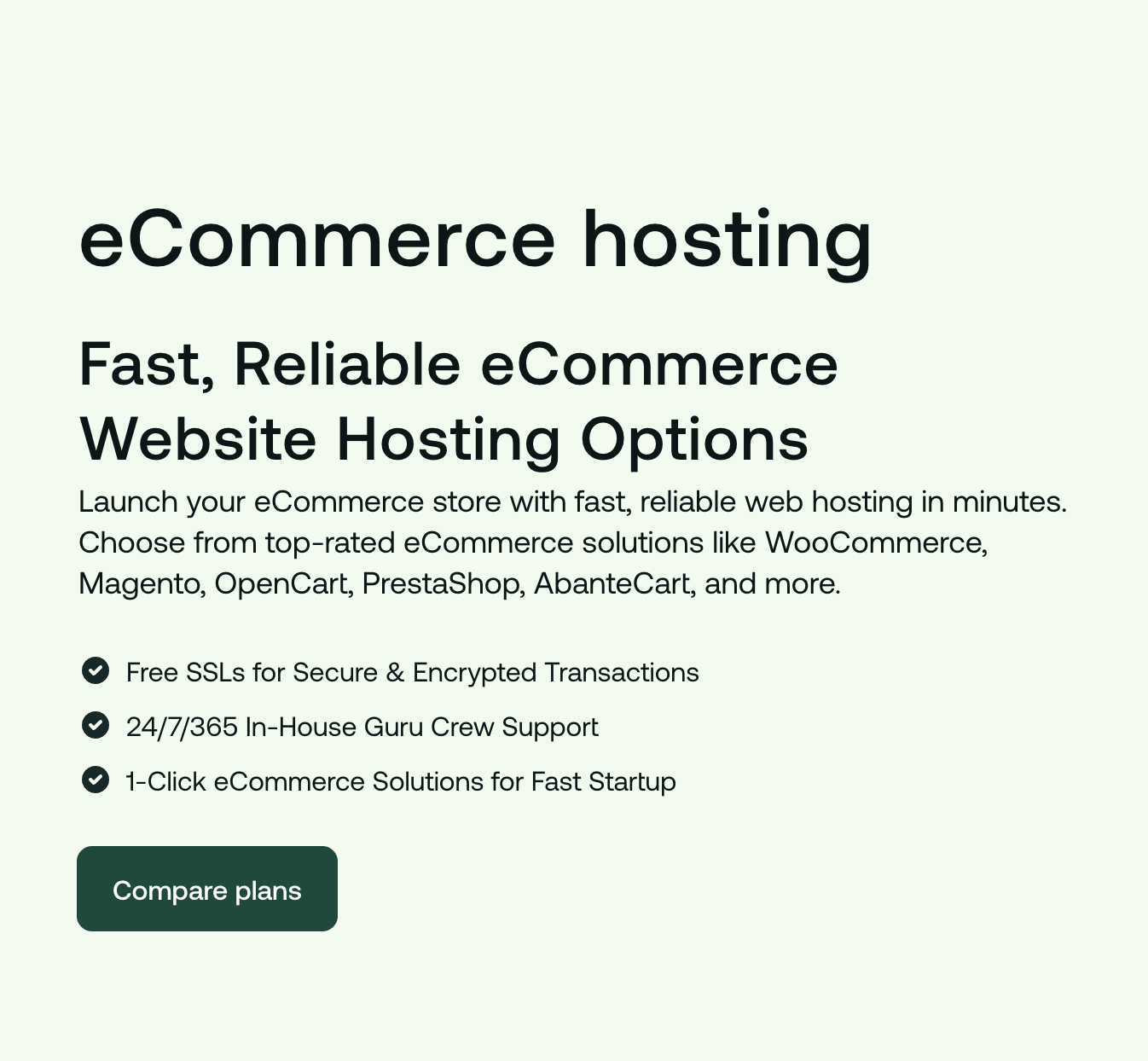
Newbies get access to the Hosting.com AI site builder and WordPress hosting, both of which deliver fast setup, drag-and-drop editing, and free professional themes. Hosting.com also offers one-click installation for numerous integrations, including WordPress, WooCommerce, Magento, and other popular platforms. These integrations are pre-configured to provide the best possible performance.
The web host offers to migrate your existing site for free in most cases if you already have a web store up and running. You also get a free SSL certificate with any plan.
Hosting.com’s ecommerce-friendly lineup now spans shared hosting starting at $1.99 per month, ultrafast VPS hosting starting at $9.99 per month, and managed VPS options that include the company’s “Faster or It’s Free” performance optimization. Dedicated servers are still available but are now quote-based, so you can tailor the hardware to your store’s workload.
Hosting.com continues to offer high-performing hosting at a very solid price. Harness the power of VPS or dedicated hosting for your online store by signing up for Hosting.com.
#6 – SiteGround – Best for Your First Ecommerce Store
Bluehost’s WooCommerce hosting is an approachable package for new and experienced online merchants, but SiteGround is the platform ideally suited for new ecommerce stores or the less tech-savvy. Its platform is beginner-friendly, supported by its responsive and knowledgeable customer support team.

This is the perfect middle ground for getting the benefits of managed WooCommerce hosting in an easy-to-use (and much cheaper) hosting environment.
SiteGround plans come with everything you need to set up your store immediately. Use SiteGround’s WordPress Starter to auto-install WooCommerce, a theme, and essential plugins, or get help from their support team to get everything in working order and even install elements like a shopping cart app.
The cheapest plan is surprisingly robust. You get unlimited subdomains and parked domains, plus unmetered traffic, unlimited databases, and an email account. Furthermore, all plans come with a free SSL certificate, daily backups, and integration with Magento, WooCommerce, and PrestaShop.
You can get started on SiteGround with one of three pricing plans:
- StartUp: Starts at $2.99 per month for one website, 10 GB storage, up to 10,000 monthly visits, enhanced security, and managed WordPress.
- GrowBig: Starts at $4.99 per month for unlimited websites, a staging environment, on-demand backups, and 30% faster PHP.
- GoGeek: Starts at $7.99 for up to 400,000 monthly visitors, up to 40 GB of web space, Git, free private DNS, and priority support.
This is one of the easiest ways to secure solid web hosting and build your online storefront with equal ease. Overall, you can’t go wrong with even the cheapest SiteGround plan.
#7 – DreamHost – Best for Hosting on a Budget
Most web admins wouldn’t consider shared hosting for an ecommerce site. However, small stores can save a ton of money by opting for shared web hosting over a more complicated or powerful ecommerce plan.
DreamHost is the ideal choice here, because you can get shared hosting with WordPress installed for free, getting you two-thirds of the way to a working web store if you don’t already have one.
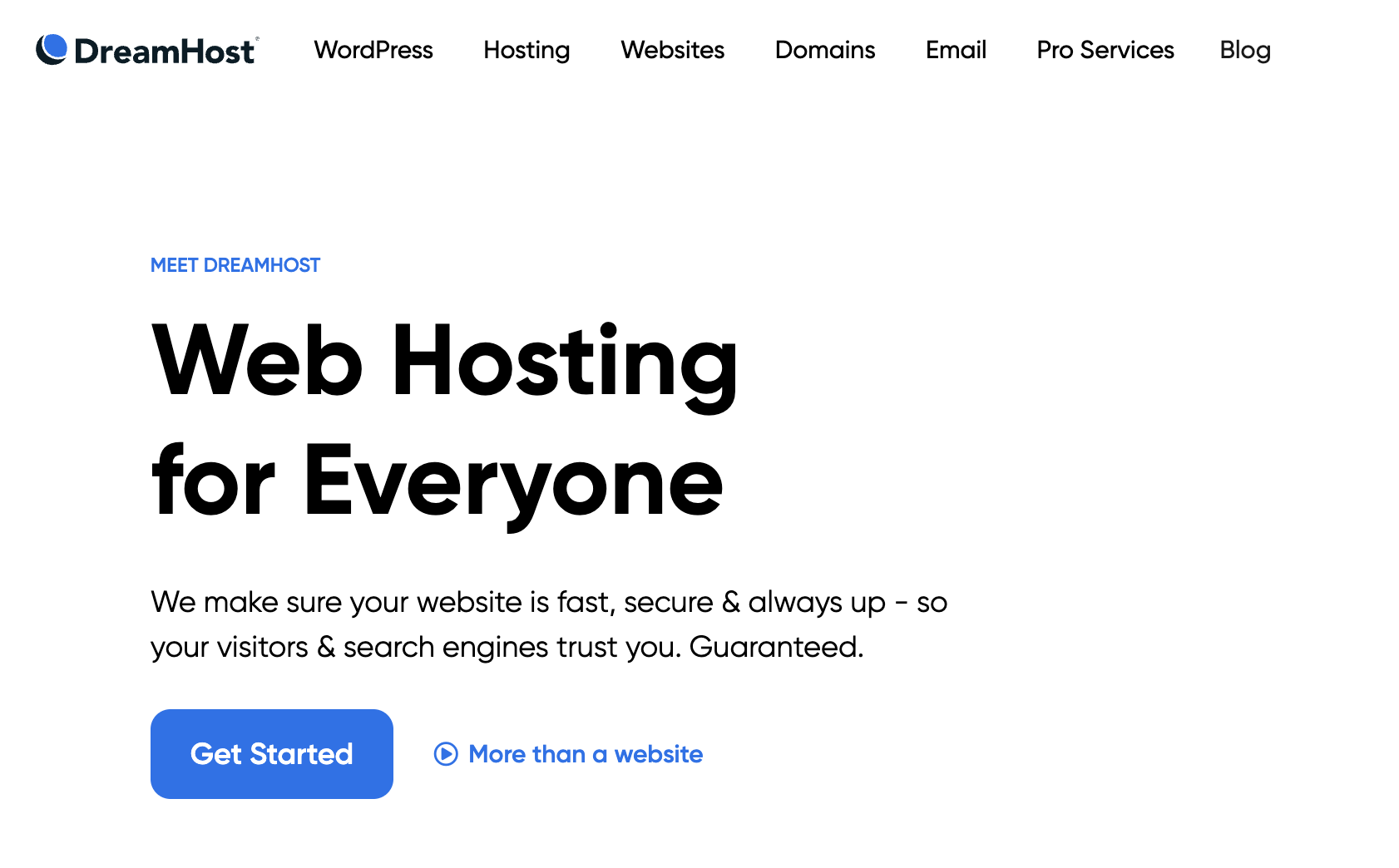
DreamHost’s shared plans come with SSL certificates, automatic daily backups, automated WordPress updates, and fast SSD storage. Plus, they’ll even handle website migration for free if you already have a web store online.
If you don’t have a working WordPress store already, there’s good news. It just takes a little extra work, but all you have to do is install a WordPress plugin for ecommerce and you can have an online store on DreamHost’s shared hosting. These plugins can range from powerful platforms like WooCommerce and BigCommerce to more focused solutions like Ecwid or Easy Digital Downloads.
So, with a little bit more elbow grease, you can build a solid WordPress-based store on DreamHost’s hosting and only have to pay for the hosting itself.
Speaking of which, DreamHost offers two shared hosting plans. Shared Starter starts at $2.59 per month for one website, while Shared Unlimited allows you as many sites as you want for $3.95 per month.
DreamHost guarantees 100% uptime. You also get live chat, email, and social media support from dedicated WordPress experts in case you need help with your website.
Get started affordably with DreamHost today.
Methodology for Choosing the Best Ecommerce Hosting Providers
There are specific criteria you can use to separate the merely good ecommerce hosting providers from the best ones. Here’s what we looked at when compiling our list of the top choices.
Performance
Most people prioritize performance when comparing ecommerce hosting providers. It’s a reasonable demand. You want a web host to keep up with your site infrastructure, traffic, and orders. You also want a scalable service that grows with your online store.
Site loading speed is a critical metric of your host’s performance. You’ll start losing customers if your pages take more than three seconds to load. Many web hosts offer add-ons to improve page loading speeds, but you still want a host that promises speedy load times right off the bat.
It can be tough to know how CPU processing power and memory on a server equates to load times for your site. If you have web hosting now, or had in the past, that isn’t cutting it, compare those resources to the packages you’re considering. Make sure you’re getting enough of an upgrade for the price.
If you don’t want to leave performance issues to chance, try going straight for a cloud, VPS, or dedicated option. However, shared hosting is an affordable entry point for individuals and startups, and some providers like DreamHost offer solid shared hosting packages that keep up with the demands of smaller ecommerce stores.
Bandwidth and File Storage
Many new online vendors are surprised to receive hefty overage fees. This is because ecommerce websites use up a lot of bandwidth and file storage, which can mean you may exceed monthly limits depending on your provider. Some providers put a limit on the number of monthly visits instead of your overall allotted bandwidth.
Therefore, check that your potential ecommerce host of choice offers enough bandwidth and file storage for your web store’s media, customer base, and popularity. Some providers offer unlimited bandwidth, an excellent option for scaling your business with minimal limitations.
Must-Have Ecommerce Features
There are basic ecommerce features you shouldn’t overlook when shopping for hosting. At the very least, your hosting provider should offer:
- SSL encryption
- Free custom domain
- Payment gateways
- Shopping cart software
Many good hosting providers also offer professional setup and migration services, as well as a free year of a custom domain. Still, be careful to read the fine print. For example, many hosting providers offer free SSL encryption only for one year or just a year of your custom domain registration. After that, you’ll need to pay.
Security features also fall under this umbrella. SSL encryption is just one component of the strong security you need for an online store.
Online stores are prime and lucrative targets for hackers. So, ensure that your hosting provider offers top-notch security. Beyond SSL, look for these features from a potential web host:
- Firewalls
- DDoS protection
- Antivirus capabilities
- Anti-spam filters
- Daily backups
Also, look for a web host who meets your compliance requirements. For example, choose a host that guarantees PCI DSS compliance if your business processes credit card payments.
Responsive Customer Support
Despite what your web host promises, problems will occasionally come up. Furthermore, every second of downtime may mean lost revenue. If this is frequent, you can also expect to lose some degree of your SEO rankings and reputation.
You need an ecommerce hosting provider who can be relied on in times of crisis. So, a responsive and available customer support team is a critical consideration. This factor is vital for managed web hosting. Ideally, your web host should provide 24/7 customer service. However, the team should also be reachable via various means, including phone, live chat, and social media.
The Top Best Ecommerce Hosting Providers in Summary
There are many terrific ecommerce hosting providers capable of satisfying your needs and budget. Partnering with a good web host will ensure optimum site performance, high conversion rates, and top-notch security. We think Bluehost ticks the main boxes for most people, but some of the options on our list may work better for your particular needs.
- Bluehost – Best ecommerce hosting for most
- Atlantic.Net – Best for PCI-Compliant Ecommerce Hosting
- HostGator – Best budget ecommerce hosting with simple scaling
- LiquidWeb – Best for managed WooCommerce hosting
- Hosting.com – Best high-performance ecommerce hosting
- SiteGround – Best for your first ecommerce store
- DreamHost – Best for hosting on a budget



